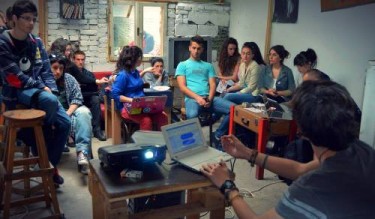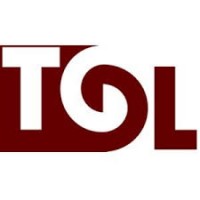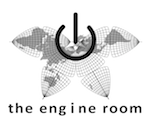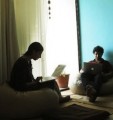This post, by Maria Grabowski, was originally published by the engine room.
This is the second in a series of posts to profile resources that are featured in the Social Tech Census. The engine room’s Social Tech Census is an online, searchable database of support for advocates around the globe looking to make better use of digital media and mobile phones. The Social Tech Census identifies a variety of resources for the use of technology in advocacy.

Image of the Open Labs courtesy of the engine room
Open Labs started the way a lot of projects start – a group of people in a bar came up with an idea. The group of founders agreed that knowledge sharing, open collaboration, open data and open source software were the base of a healthy society. Through hard work and teamwork the idea turned into an established organization – and this week Open Labs celebrates their 1st anniversary.
A non-profit NGO based in Albania, it’s both a hacker lab and a community that’s working towards a central goal: to share knowledge through open technology. Open Labs hosts weekly events to promote various online tools and technology, counting meetups, presentations, trainings, and workshops. Most events are located in the capital Tirana, but some have even expanded to as far as Kosovo, Greece and Germany. A small group of core volunteers drive the project forward, 45 members participate regularly, and several hundreds have attended the Open Labs events.
“Historically, good quality of life has always been connected to access to knowledge,” said co-founder Redon Skikuli when he spoke with us from his base in Tirania, Albania. When Redon was introduced to the open source movement and culture, he quickly saw the potential of using open technology as a channel for open knowledge. “I love technology and I thought getting into open source technology was a way of not just using technology, but using the right technology for solutions”. Still, offline meetings remain crucial, and Redon describes the Open Labs as ‘coffee-oriented’: “Here personal talk is way more effective than any other way of communication. You do business and you create communities in cafeterias.”
Six Questions from the engine room
1. How do I find Open Labs?
We have different kinds of channels: the newsletter, the website and our mailing list. Our experience though, is that word of mouth is the most significant way for people to learn about us.
2. How do I engage with Open Labs?
The first thing to do is to go to our events or participate in our workshops and projects. For example, Open Labs translates TED Talks and project them. We also have movie nights based on Creative Commons films – for example we showed the Pirate Bay documentary. Once a month we also open up the space for interesting projects that are not an Open Labs project. So, if you have an idea for an event related to open knowledge or knowledge sharing, let us know a week in advance and we’ll arrange it. Our online communication is a wall for ideas, and on the ground we get things done.
3. What kind of resources do you offer?
We have weekly events and workshops at our space in Tirana. For example you can learn how to use Linux, WordPress or learn about open standards and open data. See the coming events at our Facebook page.
4. What are your biggest challenges?
Funding! The challenge is not to find the funding, the problem is that you quickly end up spending all the time finding the money, instead of actually doing the projects. We appreciate that we have grown gradually in an organic way, and our main priority is to build a community that is free and liquid – but another challenge is to outlive the vision: Getting more people on board and making a movement in Albania.
5. What possibilities do you see in using tech for supporting and mobilizing civil society?
Smartphones have empowered us with more computing power and quality cameras that we could ever imagine. This is a tool that like every other tool can be used for a good cause such as mobilizing communities, but also for negative actions. This has happened already during uprisings in some countries. In addition, it is important to know that these devices can also be used by non-democratic governments to track our activities. That’s why the software in these mobile devices has to be free software – free as in free software not free as in free beer.
6. How may the Social Tech Census be useful for you in your work?
Collaboration and knowledge sharing with other communities at an international level is the fun part of our job. This means that every time someone contacts us and proposes a new project or collaboration it makes us more than happy that we will make our hands dirty. Every platform/project with the goal of gathering these initiatives will help the maker scene share more innovations and is more than welcome for me personally and for Open Labs as a collective.
Learn more about Open Labs…
- Find them on the Social Tech Census
- Their website
- Mail: info [at] openlabs.cc
For questions or comments about the Social Tech Census, please email the project address: resources [at] socialtechcensus.org




1 comment